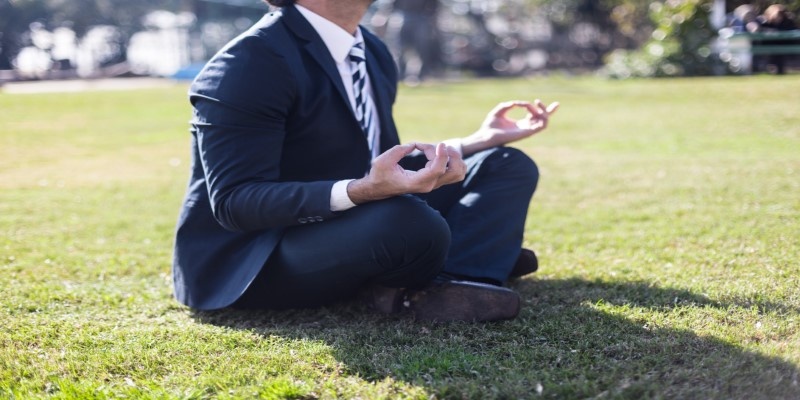How Meditation Alters Your Perception of Time
Sep 16, 2024 By Isabella Moss
Have you ever noticed how time seems to behave differently depending on what youre doing? When you're caught up in something exciting or challenging, hours can vanish in what feels like minutes. Yet during moments of boredom or stress, even a few minutes can stretch endlessly. What if there was a way to control how you experience timeto slow it down, to make it feel like you have more of it?
Many people turn to meditation as a means of achieving just that. They claim that meditation allows them to stretch out time, offering a sense of calm and clarity that makes each moment feel fuller and slower. But is there any truth to this idea? Can meditation really help you slow down time, or is it just a mental illusion? Lets take a closer look at how meditation influences time perception and whether it can truly change how we experience the passing of time.
The Subjectivity of Time
Time is an elusive concept, often described as both constant and fluid. While a clock measures time in fixed incrementsseconds, minutes, hoursour internal experience of time can feel drastically different. This subjectivity comes from how our brain interprets the flow of events. For example, time seems to race by when you're engaged in something exciting, like spending time with friends or working on a passion project. Conversely, it can feel like its crawling during dull or unpleasant moments, such as waiting in line or sitting through a long, uninteresting meeting.
This discrepancy in time perception is influenced by various factors such as attention, emotions, and the complexity of the situation at hand. When you focus intently on something, the brain allocates more resources to processing that experience, often giving the illusion that time is moving quickly. On the flip side, boredom or anxiety tends to stretch out the experience of time, making minutes feel like hours. These fluctuations suggest that time is not merely a mechanical process but a psychological phenomenon that depends heavily on the brain's internal states.
Meditation and Brain Activity
Meditation has been studied extensively for its effects on the brain. Techniques like mindfulness, transcendental meditation, and focused breathing all induce states of calm and relaxation. But how does this relate to time?

Several studies have shown that meditation can alter brainwave patterns, increasing alpha and theta brainwaves, which are associated with relaxation and focused attention. By entering these meditative states, the brain becomes less fixated on external stimuli, which can disrupt our usual perception of time passing.
A study published in 2024 found that experienced meditators reported feeling as though time had slowed during longer meditation sessions. This phenomenon appears to be related to the downregulation of certain brain networks responsible for tracking the passage of time, like the default mode network (DMN). The DMN is responsible for self-referential thoughts, such as reflecting on the past or planning for the future. When this network quiets down during meditation, the brain is no longer actively tracking time, leading to the sensation of time dilation.
The Role of Mindfulness in Perceiving Time
Mindfulness meditation, a popular form of meditation that focuses on present-moment awareness, has a particularly strong link to altered time perception. One of the central tenets of mindfulness is learning to focus on each moment without judgment or distraction. By doing so, individuals become acutely aware of the passage of timeyet paradoxically, they report feeling as if time slows down.
Research has suggested that this phenomenon happens because mindfulness helps sharpen focus on present experiences, making moments feel longer. A study published in Frontiers in Psychology in 2023 showed that participants who practiced mindfulness over several weeks became more attuned to changes in their perception of time. Many reported feeling less rushed in daily life, as if time was more plentiful.
This shift in perception may also be linked to the heightened awareness of bodily sensations and breathing that comes with mindfulness. By paying close attention to these subtle cues, the brain begins to process time differently, emphasizing the here and now rather than anticipating future moments.
Neuroscience Perspective on Time and Meditation
From a neuroscience standpoint, the impact of meditation on time perception is linked to changes in both the brains chemical and electrical activities. Dopamine, a neurotransmitter associated with pleasure and reward, has been shown to influence how we perceive time. During meditation, dopamine levels tend to stabilize, which could help explain the calming effect and altered sense of time.

Moreover, areas of the brain like the insular cortex and the anterior cingulate cortex, both of which are involved in awareness and emotional regulation, show increased activity during meditation. These regions help individuals focus more on internal experiences rather than external distractions, potentially contributing to altered time perception.
A 2024 meta-analysis of meditation research confirmed that while beginners may not experience immediate changes in their perception of time, consistent meditation practice over several months often leads to a notable shift. Meditators report feeling as though time is more elastic, bending and expanding based on their internal states rather than external pressures.
Conclusion
So, can you really slow down time by meditating? While meditation doesnt literally change the flow of time, it can profoundly alter how you experience it. Through mindfulness and other forms of meditation, your brain shifts its focus away from the future and past, grounding you more fully in the present. This shift changes your perception of time, making it feel as though time is slowing down.
For those who feel constantly rushed or overwhelmed, meditation offers a way to tap into a more relaxed state of mind where time feels abundant. While it wont grant you more hours in the day, it may just make those hours feel longer, richer, and more meaningful.
How Partnerships Are Strengthening Health Promotion Initiatives in Schools
Understanding How OCD Medication Affects Your Personality

Sweat and Germs: The Ugly Truth About Ignoring Equipment Cleanliness

Benefits of Brazil Nuts

How Meditation Alters Your Perception of Time

7 Reasons to Enjoy Peanuts in Winter But With Caution!

Exploring the Multifaceted Benefits of Avocado Oil


